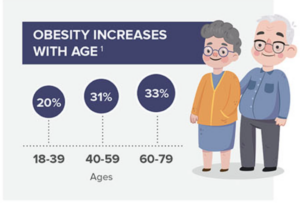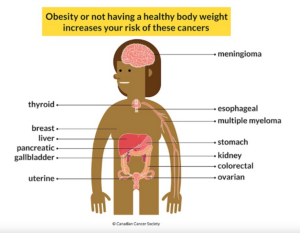“It would mean the difference between being able to keep up with my children and not being able to do anything with them” (Canadian patient, March 2022).
“It would mean I could live life instead of watch it pass by” (Canadian patient, March 2022).
When you read quotes like these from people living with obesity, it is impossible not to feel the deep sense of helplessness this disease can inflict. It is impossible not to sympathize and understand that people have exhausted all options just to experience a quality of life attributed by positive health outcomes that so many take for granted every day.
These are responses to a survey conducted by Obesity Matters from March 2 to 15, 2022, where we asked our community members what it would mean to achieve sustained weight loss of at least 5 per cent, and up to the average of 15 per cent as demonstrated in Wegovy™ clinical trials.
The feedback and call to action was overwhelming from our 104 respondents, and the message from them was clear: Canadians living with obesity and overweight need evidence-based help, and CADTH should step up to ensure patients managing overweight and obesity are served by provincial drug programs in this regard by recommending that Wegovy be reimbursed. Failure to recommend reimbursement would be failure to see, hear and recognize obesity as a disease and Wegovy as offering clinically significant and socially impactful weight loss of at least 5 per cent to appropriate patients.
To reiterate, Wegovy can provide the healthy weight management – in conjunction with a reduced calorie diet and increased physical activity – to help patients who are seeking support and have been denied equitable access to health care on public health plans in Canada to-date. Now is the time that CADTH and regional governments through their drug programs in Canada stepped up and joined other countries who have made positive HTA decisions about treatments for obesity and recommend to drug plans that they should reimburse eligible patients who use this potentially life-saving medicine.
The evidence of need and treatment gap is clear with roughly 63 per cent of Canadians living with increased health risks due to excess weight and no treatments indicated for overweight or obesity currently recommended for reimbursement on regional drug plans. About 27 per cent of Canadians are classified as living with obesity, and we know the problems this disease presents to many segments of society[1].

We also know that obesity increases with age[2], calling into question why CADTH and the regional drug plans have yet to provide evidence-based obesity treatment options to the older impacted demographic that governments are mandated to help protect from a health and safety perspective.
From a health perspective, the consequences of obesity are well recognized and include increases in blood pressure, fatty liver disease, the onset of type 2 diabetes, sleep apnea, asthma, osteoarthritis, infertility, at least 13 different cancers[3] and is associated with more than 200 other possible health complications[4].

Obesity also puts an immense strain on Canada’s mental health crisis with studies showing significant increases in major depression, bipolar disorder and panic disorder among people who are living with obesity[5],[6]. Anxiety, low self-esteem, body dissatisfaction and disordered eating are other mental-health related consequences of this disease[7],[8].
And these mental and physical conditions associated with obesity do not only affect the people living with the disease, but they also end up as burdens on families as well as education, employment, economic and healthcare systems that affect everyone. 101 of 104 of our survey respondents said obesity has affected their family or relationships.
With so many severe societal ramifications, does it not make sense to do everything in our power to break this circuit at its source? Medication for diabetes, hypertension and many other obesity-related conditions are already either subsidized or covered by provincial health care plans. Funding treatments that address the co-morbidities of obesity and not funding obesity treatments is illogical, non-evidence-based, fiscally irresponsible and adds further burden to patients managing obesity. Bariatric surgery and other surgical options to address healthy weight are covered in Canada, further calling into question why evidence-based pharmacological treatments funded by regional drug plans have not yet been made available to doctors and patients in Canada.
The CADTH and Canadian government are woefully behind in this area compared to other countries as the lack of affordable treatment options compared to the number of people living with the disease has left a massive gap in treatment. Sticking with the status quo is not acceptable and further perpetuates the inequity of access to care for this patient population.
Reimbursement of obesity medications are rising across the globe with eight of the 15 countries with restricted reimbursement for obesity treatment Saxenda coming in the last two years. Columbia, Israel and the United Kingdom in particular have progressed toward reimbursement of Saxenda[9].
Wegovy is not far behind and is well on its way to public reimbursements in the UK. In fact, the National Institute for Health and Care Excellence (NICE) in the UK recently completed their HTA review of Wegovy issued draft guidance recommending semaglutide[10]. And yet, Canada is a laggard in its understanding of obesity and failure to reimburse evidence-based treatments.
88.46 per cent of Obesity Matters’ survey respondents listed drug costs as the number one barrier to their ability to manage a healthy weight. Drug costs were a bigger barrier for respondents than the cost of healthy food, the cost of exercise or trainers, the costs of dietitians, lack of healthcare practitioner support or even weight stigma.
Contrary to stereotypes and stigma related to people managing overweight and obesity, this patient population is not composed of people who are looking for a quick fix for aesthetic reasons – we know there are no quick fixes when it comes to managing a healthy weight and obesity. Instead, this population is seeking to maintain a healthy weight based on current science that has proven at least 5 per cent weight loss has health benefits[11]. In fact, 48 per cent of our survey respondents have already taken other prescription medication for obesity and are seeking evidence-based support for health purposes: these are people with real health problems, both mental and physical, who need help. These are people who want to live longer, healthier lives, reducing the chances of obesity-related comorbidities and complications. These are people who want to participate in society, watch their children and grandchildren grow up and be able to function normally without stigma or pain.
“I want my life back. Obesity has robbed me of this. I am not a lazy slob sitting on my butt eating crap. I do not deserve to have obesity,” wrote one survey respondent. “Canada has a publicly funded healthcare system … and yet good health in Canada is treated as a privilege instead of a right for those with obesity.”
89 per cent of our survey respondents said they have had to change social or recreational plans due to managing obesity. 97 per cent said obesity has impacted their health, and 97 per cent have tried restrictive diets, exercise programs, obesity treatments, diet supplements or some other weight management solution and are still searching for a solution.
Treating obesity properly with evidence-based approaches outlined in the Canadian Obesity Guidelines, where pharmacotherapies are referenced as a first line treatment pillar, can have a significant positive impact on the quality of a patient’s life, and surely the clinical benefit and safety profile justify public payers reimbursing the product as a medically necessary treatment.
Losing weight for people living with obesity is not a simple matter of willpower because obesity is not a choice. Obesity is a chronic disease and is finally being treated as such more and more by the global medical community including the Centre for Disease Control (CDC).
With no Health Canada approved treatments covered by government drug programs in Canada, the current policies continue to perpetuate weight stigma and discrimination for people managing overweight and obesity in Canada. A similar finding related to CADTH’s positive work on exploring ways to increase its cultural competency when seeking to better address diversity and inclusion in drug decisions can be applied to the Wegovy review: Canadians managing overweight and obesity are one of the communities that have been overlooked in relation to securing supports to manage healthy weight with evidence-based treatments: “when CADTH makes recommendations without explicit consideration of these communities, CADTH may contribute to health inequalities.”[12]
Will the CADTH and Canadian government step up and join the rest of the world in recognizing obesity as a chronic disease and allow people to access proper health care? Or will they force millions to sit on the sideline, continue to perpetuate non-evidence-based messages about the positive long-term benefits of statistically meaningful maintained weight loss with the “eat less, move more” campaigns targeting all Canadians regardless of obesity disease state and watch life pass by?
Obesity Matters has cultivated a passionate community whose feelings can be summed up on the matter by this survey respondent:
“I fight every day for my health. I need more support. Getting COVID knocked me on my butt for two months and meant that I lost all of the exercise progress I had made and the weight gain that resulted meant my knees are making me nearly disabled again,” one community member shared with us to bring to the CADTH committee’s attention: “One bump in my journey and the fight back is almost impossible. Every moment of my life is dedicated to getting better, I can’t give more than that, stop the bias and give us the safety nets/options we deserve as humans. The Obesity epidemic is most definitely a result of government choices, it’s time to clean up this mess or pay a huge healthcare price in the future.”
Obesity Matters appreciates the CADTH committee’s review of our submission and video and looks forward to reviewing how Wegovy’s value to patients is addressed, ideally positively to the benefit of the currently underserved obesity patient population.
[1] https://health-infobase.canada.ca/datalab/canadian-risk-factor-atlas-obesity-blog.html
[2] https://www150.statcan.gc.ca/n1/pub/11-627-m/11-627-m2018033-eng.htm
[3] https://cancer.ca/en/cancer-information/reduce-your-risk/have-a-healthy-body-weight/reduce-your-risk-of-cancer-with-a-healthy-body-weight
[4] https://obesityopen.org/content/uploads/2020/07/Clinical-Obesity.pdf
[5] https://pubmed.ncbi.nlm.nih.gov/16818872/
[6] https://pubmed.ncbi.nlm.nih.gov/20194822/
[7] https://www.ncbi.nlm.nih.gov/pmc/articles/PMC5788730/
[8] https://www.ncbi.nlm.nih.gov/pmc/articles/PMC5644896/
[9] https://www.novonordisk.com/content/dam/nncorp/global/en/investors/pdfs/capital-markets-day-2022/P5-obesity-care.pdf
[10] https://www.nice.org.uk/news/article/nice-recommends-new-drug-for-people-living-with-obesity
[11] https://pubmed.ncbi.nlm.nih.gov/24383502/
[12] “Patient and Community Advisory Committee Meeting Summary September 15, 2020 and October 27, 2020”
